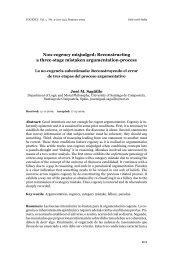Cogency v2 n2
Cogency v2 n2
Cogency v2 n2
You also want an ePaper? Increase the reach of your titles
YUMPU automatically turns print PDFs into web optimized ePapers that Google loves.
COGENCY Vol. 2, N0. 2, Spring 2010<br />
The dangers he alludes to here are simplification and formalization–<br />
processes that depend on the notion of logical form. Here (#23) of the PI is<br />
important: He asks: “How many kinds of sentences are there?” The author<br />
of the Tractatus would have said one–the proposition. For both Wittgenstein<br />
and Russell, the proposition was the essence of language because it was by<br />
means of the proposition that the fact was represented. The author of the<br />
PI, on the other hand, sees a multiplicity about which he remarked (PI, #23):<br />
It is interesting to compare the multiplicity of the tools in language, of<br />
the way they are used, the multiplicity of kinds of word and sentence,<br />
with what logicians have said about the structure of language. (Including<br />
the author of the Tractatus).<br />
These texts, taken cumulatively, serve as an indictment of PL and create<br />
the basis for the possibility that Wittgenstein might have looked approvingly<br />
at a different kind of logic, at a different attempt to develop “the logic<br />
of our language.” In that vein, I suggest that Informal Logic might be a more<br />
helpful articulation of NL than ML. Why?<br />
The relevant point for our purposes is that informal logic rejects the standard<br />
of validity and seeks instead to develop nonformal norms for the evaluation<br />
of arguments (Johnson, 2000: 119). The notion of logical form–which,<br />
as we have seen, was heavily implicated in the development of that I have<br />
called philosophical logic–is not normative for informal logic. Informal logic<br />
has understood itself from the start as an alternative to both deductive and<br />
inductive logic, 12 as a logic better suited to the realm of real world argumentation.<br />
That leads to a second reason that Wittgenstein might be thought<br />
to be friendly to informal logic. Informal logic takes seriously argument as<br />
used, seeing arguments in a real-life setting, as opposed to the artificiality<br />
of the examples associated with formal logic. 13<br />
In having set aside the notion of logical form as central to logic, in focusing<br />
on arguments as they are employed in human affairs, informal logic can<br />
perhaps be seen as tapping into and representing “the spirit of the later<br />
12<br />
Both deductive and inductive seem to takes themselves to be offering articulations of<br />
norms implicit in NL.<br />
13<br />
But see Goddu (2009).<br />
94








